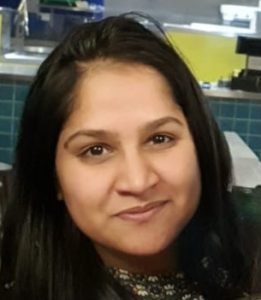Meet the Trainer – Varsha Kale

Meet Varsha Kale, a Bioinformatician in the Finn team: Microbiome Informatics at EMBL-EBI and one of the trainers at the EMBL Course: Metagenomics Bioinformatics (08 – 12 November 2021).
We virtually sat down with Varsha and quizzed her on where she thinks the field of Metagenomics is heading in the future; and some inside information on what you can expect from the course.
What is your research focus and why did you choose to become a scientist?
Using metagenomics to characterise the chicken and salmon gut microbiome and its functions.
I enjoyed learning about bacteria and how they thrived in various environments. This opened a world of different microbes from symbiotic, commensal to pathogenic and highly resistant. It was exciting! When working in a lab, we would receive pre-analysed sequencing data from bioinformaticians. My mentors at the time were supportive to indulge my curiosity as to how the analysis was performed and hence I chose to study bioinformatics. At EMBL-EBI I have the opportunity to learn about new tools and analysis methods frequently.
Where do you see this field heading in the future?
The continued expansion of novel genomes and annotations deposited in public archives will give us more and deeper insight into some elusive environments. Additionally, as statistical modelling becomes more popular, many of the methods we use for annotation are adopting machine learning techniques. The challenges will be the integration of different data types, judging the optimal cutoffs for accurate annotation, and continuing to ensure that all of these new types are easily available through community-adopted public repositories.
How has training influenced your career?
I have been lucky to have opportunities to attend training courses which helped tremendously with understanding the basics of a new subject. Also, a field such as metagenomics is progressing so fast that training gives a great snapshot of the recent updates and methods that others are using for similar research.
What is your number one tip for people looking for scientific training?
Keep up to date with upcoming courses which are interesting to you. Twitter or LinkedIn can be useful for this, or even the webpages of some of your favourite institutions. However, I found that asking colleagues and peers about training courses they have attended is most informative.
If you weren’t a scientist, what would you be?
To be honest, I went home one day from school and startled my parents with the news that bacteria are the new “cool” – so I’m not sure that I would have done something else! I enjoy singing and it might have been fun and challenging to pursue that.
Which methods and new technologies will be addressed in the course?
There is currently a lot of interest in generating metagenome assembled genomes (MAGs) from microbiome data, so we will work through this process including potential tools you might use for the various steps, as well as things to consider in controlling the quality of your data. An introduction to MGnify will also highlight the specialised pipelines used to analyse different types of microbiome data: amplicon, WGS reads, and assemblies.
What are the highlights of the course?
The course will give an overview of metagenomic data analysis including, browsing public data, quality control, and assembly of sequenced metagenomes, tools, and methods to analyse metagenomic data and submission to public archives. There will be a mixture of live and recorded talks, practicals, and Q&A’s with lots of opportunities for discussion. A personal highlight is the chance to learn about the research projects of others attending the course!
Interested in this course? Apply by 03 September.
For more upcoming events on cancer research take a look at our event listing.